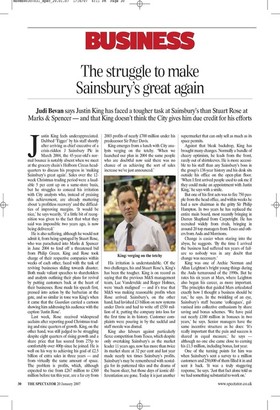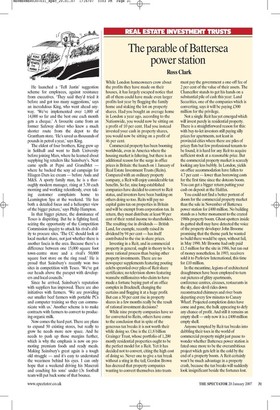The struggle to make Sainsbury's great again
Judi Bevan says Justin King has faced a tougher task at Sainsbury's than Stuart Rose at Marks & Spencer — and that King doesn't think the City gives him due credit for his efforts Justin King feels underappreciated. Dubbed `Tiggef by his staff shortly after arriving as chief executive of a crisis-ridden J Sainsbury Plc in March 2004, the 45-year-old's normal bounce is notably absent when we meet at the grocery chain's Holborn Circus headquarters to discuss his progress in 'making Sainsbury's great again'. Sales over the 12week Christmas trading period were a laudable 5 per cent up on a same-store basis, but he struggles to conceal his irritation with City analysts who, instead of praising this achievement, are already muttering about 'a profitless recovery' and the difficulties of improving margins. 'It would be nice,' he says wearily, 'if a little bit of recognition was given to the fact that what they said was impossible two years ago, is now being delivered.'
He is also suffering, although he would not admit it, from being upstaged by Stuart Rose, who was parachuted into Marks & Spencer in June 2004 to fend off a threatened bid from Philip Green. King and Rose took charge of their respective companies within weeks of each other, faced with the task of reviving businesses sliding towards disaster. Both made valiant speeches to shareholders and analysts outlining their plans for revival by putting customers back at the heart of their businesses. Rose made his speech first, pressed into action by the barbarian at the gate, and so similar in tone was King's when it came that the Guardian carried a cartoon showing him addressing his audience with the caption 'Justin Rose'.
Last week, Rose received widespread acclaim after reporting good Christmas trading and nine quarters of growth. King, on the other hand, was still judged to be struggling despite eight quarters of rising growth and a share price that has soared from 275p to comfortably over 400p since he joined. He is well on his way to achieving his goal of £2.5 billion of extra sales in three years — and from virtually the same amount of space. The problem is profits, which, although expected to rise from £267 million to £360 million before tax this year, are a far cry from 2003 profits of nearly £700 million under his predecessor Sir Peter Davis.
King emerges from a lunch with City analysts verging on the tetchy. 'When we launched our plan in 2004 the same people who are doubtful now said there was no chance of us achieving the sort of sales increase we've just announced.'
His irritation is understandable. Of the two challenges, his and Stuart Rose's, King's has been the tougher. King is on record as saying that the previous M&S management team, Luc Vandevelde and Roger Holmes, were 'much maligned' — and it's true that M&S was making reasonable profits when Rose arrived. Sainsbury's, on the other hand, had lavished £3 billion on new systems under Davis and had to write off £550 million of it, putting the company into loss for the first time in its history. Customer complaints were pouring in by the sackful and staff morale was dismal.
King also labours against particularly fierce competition from Tesco, which despite only overtaking Sainsbury's as the market leader 11 years ago, now has more than twice its market share at 32 per cent and last year made nearly ten times Sainsbury's profits. Sainsbury's may be remembered with nostalgia for its patterned tiles and the drama of the bacon slicer, but those days of iconic differentiation are gone. Today it is just another supermarket that can only sell as much as its space permits.
Against that bleak backdrop, King has brought many changes. Normally a bundle of cheery optimism, he leads from the front, rarely out of shirtsleeves. He is more accessible to his staff than any Sainsbury's boss in the group's 138-year history and his desk sits outside his office on the open-plan floor. 'When I first arrived people used to ask me if they could make an appointment with Justin King,' he says with a smile.
But one of his first acts was to fire 750 people from the head office, and within weeks he had a new chairman in the gritty Sir Philip Hampton. In two years he has replaced the entire main board, most recently bringing in Darren Shapland from Carpetright. He has recruited widely from rivals, bringing in around 20 top managers from Tesco and others from Asda and Morrisons.
Change is easier when staring into the abyss, he suggests. 'By the time I arrived the business had suffered ten years of failure so nobody was in any doubt that change was necessary.'
King was one of Archie Norman and Allan Leighton's bright young things during the Asda turnaround of the 1990s. But he rates his six years at Mars, where Leighton also began his career, as more important. 'The principles that guided Mars articulated exactly how I thought a business should be run,' he says. In the twinkling of an eye, Sainsbury's staff became 'colleagues', galvanised into collective enthusiasm by share saving and bonus schemes. 'We have paid out nearly £100 million in bonuses in two years,' he says. Senior managers have the same incentive structure as he does: 'It's really important that the pain and success is shared in equal measure,' he says — although no one else came close to earning his £1.5 million, including bonus, last year.
One of the turning points for him was when Sainsbury's sent a survey to a million customers and 250,000 of them filled it in and sent it back. 'It was a truly staggering response,' he says. 'Just that fact alone told us we had something substantial to work on.'
He launched a 'Tell Justin' suggestion scheme for employees, against resistance from executives. 'They said they'd tried it before and got too many suggestions,' says an incredulous King, who went ahead anyway. 'We've implemented over 1,000 of 14,000 so far and the best one each month gets a cheque.' A favourite came from an former Safeway driver who knew a much shorter route from the depot to the Grantham store. 'He's saved us thousands of pounds in petrol a year,' says King.
The eldest of four brothers, King grew up in Solihull and went to Bath University before joining Mars, where he learned about supplying big retailers like Sainsbury's. Next came spells at Pepsi and GrandMet — where he backed the sexy ad campaign for Haagen-Dazs ice cream — before Asda and M&S. A sporty family man, he is a thoroughly modern manager, rising at 5.30 each morning and working relentlessly, even taking customer complaints home to Leamington Spa at the weekend. 'He has both a detailed focus and a helicopter view of the bigger picture,' says Philip Hampton.
In that bigger picture, the dominance of Tesco is dispiriting. But he is fighting hard, seizing the opportunity of the Competition Commission inquiry to attack his rival's ability to procure sites. 'The CC should look at local market share, not just whether there is another fascia in the area. Because there's a difference between one 15,000 square foot town-centre store and a rival's 50,000 square foot store on the ring road.' He is proud that Sainsbury's recently won two sites in competition with Tesco. 'We've got our heads above the parapet with developers and local councils.'
Since he arrived, Sainsbury's reputation with suppliers has improved. There are also initiatives with farmers. 'We are providing our smaller beef farmers with portable PCs and computer training so they can communicate with us.' Another scheme is to make contracts with farmers to convert to producing organic milk.
Now comes the hard part. There are plans to expand 50 existing stores, but really to grow he needs more new space. And he needs to push up those margins further, which is why the emphasis is now on promoting premium foods and ready meals. Making Sainsbury's great again is a tough old struggle — and it's easy to understand the weariness behind his eyes. I can only hope that a weekend driving his Maserati and coaching his sons' under-13s football team will put back some of that bounce.






















































 Previous page
Previous page